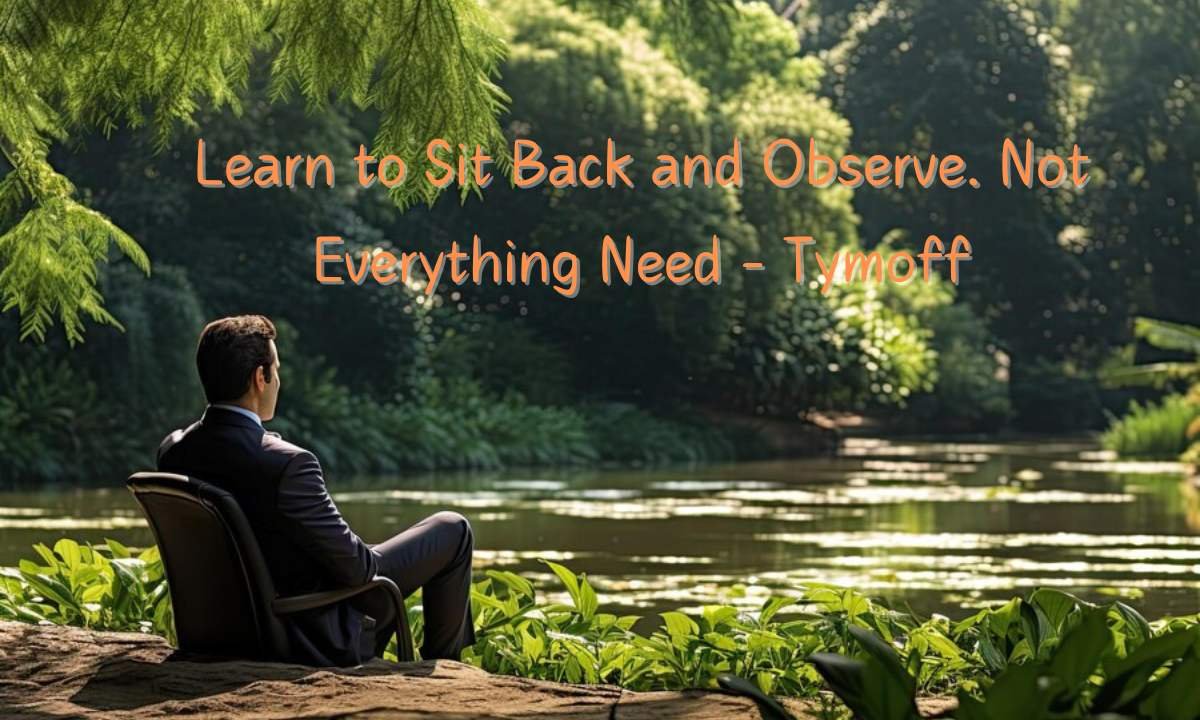Introduction:
“Learn To Sit Back And Observe,” Is Quoted. The Quote “Not Everything Needs” Ascribed To Tymoff Reflects A Careful Observation And Discernment-Based Worldview. This Guide Examines This Statement’s Philosophical, Psychological, And Practical Aspects And Provides Insights Into Its Applicability To Interpersonal Interactions And Personal Development.
Context And Origin Of The Quote:
- Who Is Tymoff?: Provide Background Information On Tymoff, The Context In Which The Quote Was Made, And Any Relevant Biographical Details.
- Significance: Discuss Why This Quote Resonates In Discussions About Mindfulness And Perspective-Taking.
Understanding The Quote:
- Observation Defined: Define Observation As The Act Of Watching And Understanding Situations Without Immediate Action Or Judgment.
- Selective Engagement: Explore The Idea That Not Every Situation Requires Immediate Intervention Or Response.
Philosophical And Psychological Implications:
- Mindful Awareness: Discuss How Mindful Observation Promotes Deeper Understanding And Insight Into Oneself And Others.
- Emotional Intelligence: Analyze The Role Of Observation In Developing Emotional Intelligence And Empathy.
Practical Applications In Daily Life:
- Personal Reflection: Techniques For Cultivating The Habit Of Sitting Back And Observing Before Reacting Or Responding.
- Conflict Resolution: How Observation Can Facilitate More Effective Communication And Conflict Resolution.
Benefits Of Sitting Back And Observing:
- Decision-Making: Strategies For Using Observation To Make Informed Decisions And Avoid Impulsive Actions.
- Stress Reduction: How Adopting A More Observant Mindset Can Reduce Stress And Promote Mental Well-Being.
Cultivating Observational Skills:
- Mindfulness Practices: Techniques Like Mindfulness Meditation To Enhance Observational Skills And Presence Of Mind.
- Active Listening: Importance Of Active Listening As A Component Of Effective Observation And Understanding.
Quotes And Insights From Thought Leaders:
- Additional Perspectives: Include Quotes Or Insights From Other Philosophers, Psychologists, Or Leaders On The Value Of Observation And Mindfulness.
Conclusion:
“Learn To Sit Back And Observe,” Is Quoted. Tymoff’s “Not Everything Needs” Promotes Selective Participation And Careful Observation. It Encourages People To Take A Moment To Stop, Think, And Get Perspective Before Acting Or Passing Judgment.
Last Words:
People Can Develop More Self-Awareness, Empathy, And Clarity In Their Relationships And Decision-Making Processes By Adopting The Habit Of Taking A Step Back And Observing. A Greater Understanding Of Life’s Intricacies And More Meaningful Relationships Can Result From Comprehending And Putting This Quote’s Guiding Ideas Into Practice. This Tutorial Offers A Contemplative Examination Of The Saying “Learn To Observe And Take A Step Back.” Not Everything Needs – Tymoff,” Providing An Understanding Of Its Philosophical Underpinnings And Useful Applications In Self-Improvement. Please Let Me Know If There Are Any Particular Areas You Would Like To Learn More About Or If You Would Like Me To Include Anything Else.

